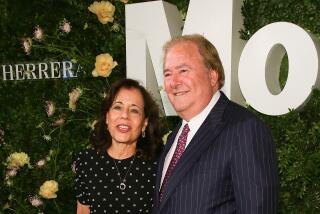Once Admired, Entrepreneurs Face Skeptics
- Share via
The reaction to the fall of Barry Minkow, youthful founder of a company called ZZZZ Best Co., has been remarkable. National television has covered the bankruptcy of what, after all, is a small Southern California company. Articles in major national newspapers have recounted how Minkow, 21, went from being head of a business worth more than $200 million to a man tarnished by police statements linking him to organized crime.
Minkow’s lawyer called the statements “preposterous” and denied them all. But the police accusations are not what is catching public attention. Rather, it is fascination with the fall from grace of a young man who is said to have dreamed up a carpet cleaning business in his parents’ garage at age 15. That the company and its founder were not all they were cracked up to be, is only confirming the public in its growing suspicion of fast money.
The reaction reflects a shift in public attitudes. The entrepreneur, the independent person who steps out on his or her own to start a business, increasingly is suspected of doing it for the money. Only yesterday, these risk-takers were hailed for innovation and vision.
Think about it. The earliest reference to starting a business in a garage was to William Hewlett and David Packard, two engineers who founded Hewlett-Packard--one of the world’s great companies--in a garage near Stanford University in 1939. Ultimately their company’s success made Hewlett and Packard two of the richest men in the country. But the public, rightly, saw the riches as a well-deserved reward for their work, never the goal.
Then there were Steven Jobs and Stephen Wozniak, the co-founders of Apple Computer who tinkered in a garage and came up with the first personal computer, Apple Computer, in 1975. Jobs and Wozniak were admired not only for pioneering but, as the little guys competing with computer giants.
Many Were Hailed
And there were many more entrepreneurs like Jobs and Wozniak, hailed in the early 1980s as the kind of people who would simultaneously restore America’s competitiveness and lead the country out of recession.
Such public attitudes pay off. In the first half of 1983, more than 500 new companies--a record--were able to raise financing by selling stock to the public. Money poured in.
Since then attitudes have changed--partly because there was a lot of money lost in 1983’s entrepreneurial surge. But more than investor disappointment is at work. The lone wolf entrepreneur is criticized as disloyal and greedy by such trendy academics as Robert Reich of Harvard University.
Fortune magazine, which these days is attempting to speak to a young audience, recently criticized business’ obsession with money in a cover article titled “The Money Society.”
The article’s analysis was overblown but, like the reaction to Minkow, reflected the new attitude. The markets know it. In this year’s first half, 361 new companies went public, according to Fort Lauderdale, Fla.’s Institute of Econometric Research, off from 387 for the comparable period last year and well down from 1983. Also, venture capitalists appear to be shifting toward financing new companies at later, more stable stages of development.
Shift to Team Approach
If the lone wolf is out, who’s in? The team approach. You’ll hear more about employee teams in factories and offices, more sentiments such as that expressed recently by Jack D. Kuehler, executive vice president of IBM, that “for too long we have rewarded the innovator and neglected the manufacturer.”
Nothing wrong with giving manufacturing more respect. And public skepticism of entrepreneurs will be healthy if it gives investors pause about companies like ZZZZ Best--which sold stock to the public in January and was in bankruptcy court by July.
But in the end a word needs to be said for people who go out on their own. And, fittingly, Henry Ford--who started his business in a shed because, naturally, garages were not yet invented--said it best: “The pioneer spirit is what America has, over and above any country,” Ford wrote. “If we ever lose that spirit, we shall stop going forward and start to go back.” Phonies like Minkow shouldn’t make us lose sight of that.
More to Read
Inside the business of entertainment
The Wide Shot brings you news, analysis and insights on everything from streaming wars to production — and what it all means for the future.
You may occasionally receive promotional content from the Los Angeles Times.










